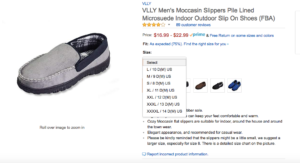Why is Everyone Ga-Ga for Amazon’s Recommendations Engine?

I talk to people about Machine Learning and Predictive Analytics everyday. During the course of that conversation, the topic of Amazon’s Amazing Recommendations generally comes up as an example of the Gold Standard of recommendation engines.
But you know what? I really don’t think so.
As I was browsing around Amazon the other day, I noticed some slipper recommendations at the bottom of the page, based on my previous purchase history. Okay, great!

So I click on a pair that looks interesting, and check the sizing available:

Now footwear, where I am concerned, is a bit of a challenge. I have a 14 EEE shoe size, which seems to be harder and harder to come by these days. Thus I’m always on the lookout for something that suits my style, and that will fit comfortably.
It can be a challenge, let me tell you.
So when I saw these slippers in my recommendations, I thought: “Great!” and I clicked on them, and checked the sizes. While they did indeed have a 14D, there was no 14EEE.
And thus my question: If I have been buying 14EEE shoes at Amazon for years, why is it showing me shoes that do not come in my size, despite the fact that it knows my size quite well, and the NoSQL nature of it’s dataset certainly lends itself to such predictive results. So why do I not see these results?
The answer is pretty simple, really: They’re not mining these types of attributes for the recommendations, although they certainly could do so.
I was teaching a Machine Learning course to Verizon a couple months ago, and the subject of Amazon’s recommendation engine came up. I could see the light in the eyes of the engineer’s as they spoke with near hushed tones about the invulnerability of Amazon’s recommendations. As the discussion progressed, we started talking about what types of data can be used to predict accurate recommendations. The list is long. Longer than you might think, and actually becomes quite granular as you consider the data in greater detail.
The bottom line is this: Amazon knows what style of shoe (or slipper) I prefer, and it knows the size that I always buy. It should, in theory, be showing me only those slippers that at the very least come in my size.
So when you are confronted with the fact that your sites recommendations are not as good as Amazon, fret not. You can beat them.
Just drill a bit deeper into your data; the genotype you create from a product can be very tightly matched to a customer’s preferences.